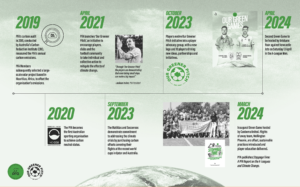Ahead of this weekend’s second Green Game between Brisbane Roar and Newcastle Jets in the A-League Men, the PFA takes a look back at the five year journey that culminated in the initiative.
Climate conscious footballers and football clubs are not a new concept, but the movement towards more sustainable and ‘green’ football is certainly growing in Australia.
This A-Leagues season there will be two Green Games – the inaugural match was played between Canberra United and Wellington Phoenix in the A-League Women last month – while Brisbane Roar and Newcastle Jets in the A-League Men this Saturday.
🗣️ "It's really important that we take on initiatives like this."
Following the first ever A-Leagues Green Game, @CanberraUnited's Sasha Grove spoke about the importance of spreading awareness about football's impact on the environment.
📲 To find out more, read the PFA’s… pic.twitter.com/DpwLvsMM87
— Professional Footballers Australia (@thepfa) March 27, 2024
The Green Game initiative follows on from other examples set around the football world.
In the United Kingdom, clubs from up and down the football pyramid take part in the Green Football Weekend, which saw high-profile players and media figures encouraging fans to reduce emissions and raise awareness. The initiative reached up to 30 million fans and inspired 63,370 actions or pledges to sustainable behaviour.
Ahead of the 2023 FIFA Women’s World Cup, 44 players from four different nations competing at the tournament agreed to offset the environmental impacts of their flights to the tournament, which was described as the biggest player-led climate action in the game’s history.
English League Two side Forest Green Rovers became the first football club in the world to be declared carbon neutral in 2018 and was recognised by the United Nations as “the greenest team in the world”. Their stadium – The New Lawn – has a number of eco-friendly features which help make it one of the most environmentally sustainable football grounds in the world. This includes having he first world’s first organic football pitch, solar panels on the roof and outside the stadium, recyclable rainwater and all waste cooking oil is recycled into biofuel.
Meanwhile, German football giants Werder Bremen published their own sustainability report and use 100% green electricity, and have pledged to reduce their greenhouse gas emissions to net zero by 2040 among a range of initiatives.
The Green Games are player-driven initiatives to introduce new sustainable practices into A-League clubs and to raise awareness for the impact of the climate on competition, and were devised by the PFA’s Our Greener Pitch player group.
Saving 91st-minute penalties and saving the planet 🙅♂️♻️ Macklin Freke 👏
The @brisbaneroar goalkeeper was spotted cleaning up the benches at Commbank Stadium after the Roar’s win against Western Sydney Wanderers.
Credit to the eagle-eyed @longjohn1987 for spotting it first! pic.twitter.com/0NIh9e27uQ
— Isuzu UTE A-League (@aleaguemen) April 8, 2024
Canberra United and Wellington Phoenix’s A-League Women’s clash on March 24 at McKellar Park was the first of the two Green Games.
These games will have a focus on reducing carbon pollution, offsetting unavoidable emissions, introducing new sustainable practices at clubs, and will raise awareness about the relationship between climate change and football.
“The Green Games are an awesome first step that we can take as a club. Also, as a league, it’s going to be really good for the future. As climate change becomes more of an issue, it’s an opportunity for us as athletes to use our platform and showcase it to our fans,” Canberra’s Emma Ilijoski said.
“We know that it’s not going to be an easy change straight away. Athletes are also not the best examples – we have to travel. But whatever we can do to help, it has to start somewhere.”
🟢@CanberraUnited and @brisbaneroar will host two ‘Green Games’ in the #ALeagues across March and April, with players and clubs using the fixtures to reduce the impact of football on the environment ⚽️#SupportingThePlayers#BuildingTheGame https://t.co/jSaNhgjGZD
— Professional Footballers Australia (@thepfa) March 4, 2024
But this is a journey that started back in 2019.
The PFA took the first steps by having their annual carbon emissions measured by the Australia’s Carbon Reduction Institute (CRI). Members subsequently selected a large-scale solar project in Mauritius, to help offset the organisation’s emissions.
Within a year, the PFA became the first Australian sporting organisation to achieve a carbon neutral status.
The PFA then launched ‘Our Greener Pitch’ in April 2021, an initiative which encouraged players, clubs and the football community to take individual and collective action to mitigate the effects of climate change.
Just over two years later in September 2023, both the Socceroos and Matildas demonstrated a commitment to address climate change by purchasing carbon offsets, that covered their flights at both the 2022 FIFA Men’s World Cup in Qatar and 2023 FIFA Women’s World Cup on home soil.
A month later, Our Greener Pitch evolved into a player advocacy group, with a new logo and 10 players driving new ideas, partnerships and initiatives.
On the day of the first Green Games, the PFA published ‘Stoppage Time: A PFA Report on the A-Leagues and Climate Change‘, which explored the impact of climate on Australia and New Zealand’s professional domestic football competitions, the A-Leagues, examining the impact of extreme heat, bushfires, flooding and rain.
It also provided solutions for clubs and the league to mitigate the impact of climate change.
You can read the Stoppage Time report here.








